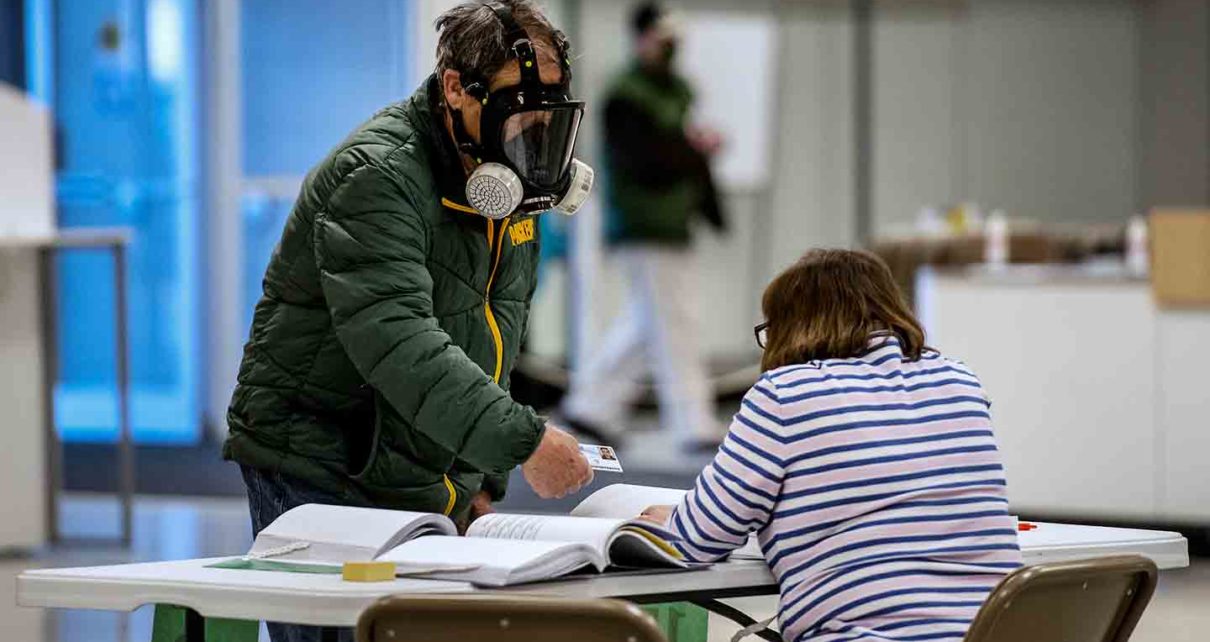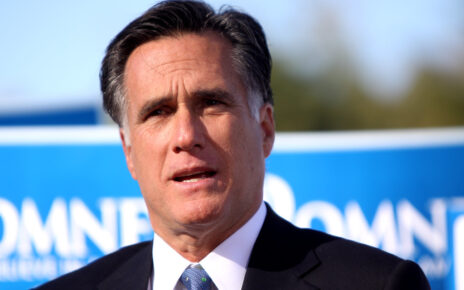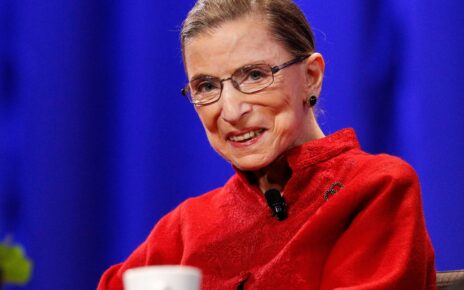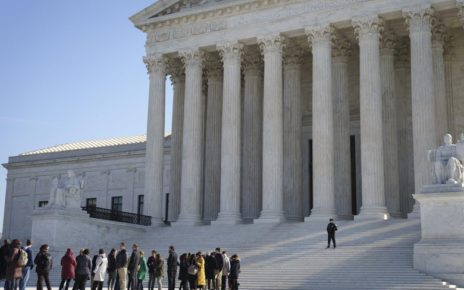This cannot become the new normal.
Robert Forrestal wears a chemical mask to protect against Covid-19 as he votes on April 7, 2020, in Janesville, Wisconsin. (Angela Major / The Janesville Gazette via AP)
Madison, Wisconsin—They were sabotaged by politicians. They were subverted by judicial activists on the courts.
ose between sheltering at home and protecting themselves from the coronavirus pandemic or exercising their right to vote.
Thousands of Wisconsinites decided Tuesday to take the risk and cast their ballots in an election that should have been postponed. Hours after an effort by Democratic Governor Tony Evers to extend absentee voting so that no one would have to cast in-person ballots on Tuesday was challenged by Republican leaders in the legislature and then blocked by political cronies of those Republicans on the Wisconsin Supreme Court and by the US Supreme Court, voters started showing up at the limited number of polling places that were opened in Milwaukee.
They spaced themselves six feet apart, forming lines that stretched out of those polling places and snaked down streets and around corners, for block after block. They waited for hours. Armed only with handmade masks and their faith in democracy, they persisted. When it began to rain, when hail pelted southeastern Wisconsin, they persisted. Some carried signs, like the one Jennifer Taff held as she waited for two hours to cast a ballot at Milwaukee’s Washington High School: this is ridiculous. “I’m disgusted. I requested an absentee ballot almost three weeks ago and never got it,” she told the Milwaukee Journal Sentinel. “I have a father dying from lung disease and I have to risk my life and his just to exercise my right to vote.”
Most were furious. Gretchen Fennema, a 46-year-old from Milwaukeean, applied for an absentee ballot for herself, as did her 70-year-old father, who suffers from bronchitis. The ballots never came. “So we decided Monday night that we were going to have to go,” said the laid-off worker. “There was no other option. We were not going to miss voting. I cannot remember when I ever missed an election.” Fennema and her dad headed to Riverside High School in Milwaukee, waited in a line of cars, and finally cast a curbside ballot. As they drove away, Gretchen attached an “I Voted” sticker on the bandana that served as her mask and posted a selfie with a message for the legislators and the courts: “Fuck you, Wisconsin GOP.”
Yet, while Fennema voted with a vengeance, tens of thousands of Wisconsinites could not, and initial reports Tuesday night suggested that turnout could be significantly down from comparable spring elections.
Riverside High School was one of just five polling places that opened in Milwaukee Tuesday, a city that usually operates 180 voting centers on election day. Because so many poll workers are older, and because so many of them chose not to take the risk of working this election, cities across the state had to cut their operations to the bone. In Green Bay, where only two polling places opened, voters waited three and a half hours to cast ballots at a local high school where the line surrounded the building. They were the ones who could make it to the polls. Throughout the day, there were reports of immunocompromised Wisconsinites who did not get absentee ballots they had requested and who did not dare go vote in person. The chaotic circumstance confirmed the concern of Green Bay Mayor Eric Genrich, who had warned before the election, “We’re in the position of asking people to choose either their health or their right to vote and in our opinion that’s unjust, it’s unlawful, it’s unsafe.
Wisconsinites were justifiably outraged by the position they were put in by the decisions of the state Supreme Court and then the US Supreme Court to force the state to hold a dangerous and convoluted election at a time when people are being told to stay at home to protect themselves from a deadly virus.
Emilio De Torre, director of community engagement for the American Civil Liberties Union of Wisconsin, observed Tuesday, “People seem to literally be taking their life into their hands to attempt to vote.” They were placed at risk unnecessarily; 15 other states that were set to vote in this period decided to move their elections—or to rearrange them in ways that averted in-person voting. But in Wisconsin, the epicenter of the sort of win-at-any-cost politics favored by President Trump, Republican legislators and their allies on the courts upended a plan by Evers to cancel in-person balloting and to extend voting for local elections, a critical contest for a seat on the state Supreme Court and a Democratic presidential primary that pitted former vice president Joe Biden against Vermont Senator Bernie Sanders.
While the story of Wisconsin on Tuesday was, as Lieutenant Governor Mandela Barnes described it, that of an electoral “shit show,” nothing political stays in Wisconsin. The state has for more than a decade provided a template for the national political strategies of Republicans like Trump. Tere was no hyperbole in Democratic Party of Wisconsin chair Ben Wikler’s assertion that “Wisconsin’s election offers a nightmare vision of what the whole country could see in the fall. A fight in which Democrats struggle to balance democracy with public health, and the GOP remorselessly weaponizes courts, election laws, and coronavirus itself to disenfranchise the voters who stand in its way.”
Evers took criticism from some advocates for not pushing harder. Like too many Democrats in too many states, he still held out hope for compromise and cooperation. But it never came. The governor was up against the whole machinery of voter suppression as it exists in Wisconsin—a state where former governor Scott Walker and his allies spent the better part of a decade making it harder to vote—and nationally. Evers tried to find common ground with Assembly Speaker Robin Vos and Senate majority leader Scott Fitzgerald. Yet the Republicans mocked the governor’s efforts to protect the health and safety of Wisconsinites who, by a 51–44 margin in the latest Marquette University Law School poll, favored postponing the election. They weren’t worried about Tuesday’s presidential primary. They were focused on the Wisconsin Supreme Court race that pitted a progressive challenger against a right-wing judicial activist appointed to the high court by Walker. Their bet was that pushing ahead with the election would sustain their efforts to dominate the courts.
Support Progressive Journalism
When Evers called a special session of the Legislature last Saturday to reorganize the election plan in accordance with public health advisories, Vos and Fitzgerald refused to entertain the idea of conducting a safe and fair election. They took the Assembly and the Senate in and out of session in a matter of seconds. Their obstruction in a time of emergency—when epidemiologists were urging postponement—was not merely a matter of ideology or partisanship. Democratic and Republican leaders, conservatives and liberals, in 15 states have agreed to election delays and other changes since the Covid-19 crisis began.
But two bottom lines were absolutely clear.
First, the disenfranchisement hit the most vulnerable voters, many of whom live in traditionally Democratic communities. Lieutenant Governor Barnes—a Milwaukeean who had to scramble to get his absentee ballot postmarked on Tuesday after the courts closed one window for submitting them—put it best when he said: “People died fighting for the right to vote, and now people might die if they vote. Today’s election in Wisconsin is far from free and fair—politicians are silencing the voices of Black and Brown people or putting us in harm’s way for their own partisan gain.”
Second, this story will not end in Wisconsin. “We have already seen more litigation, even before COVID, than ever before in 2020,” says Marc Elias, an expert on election law who frequently represents the Democratic Party on voting issues. “What COVID has done is added fuel to that fire.”
Voting rights advocates must accept that there will be Republicans who seize every opening to thwart high-turnout elections this fall—including a president who is already attacking vote-by-mail strategies. The courts cannot be counted on. Progressives in Washington and in the statehouses must recognize what they are up against and focus more intensely than ever on legislative and organizing responses that will assure a safe and fair November election. Wherever possible, they must ramp up planning and options for alternatives to in-person voting. And they must channel the anger of voters like Gretchen Fennema, who told me Tuesday, “We are in a rough spot right now. We can’t give up. They want us to give up. But, no, not us—not this time.”
Source: Wisconsin’s Pandemic Election Is a Red Alert for Democracy in America | The Nation





